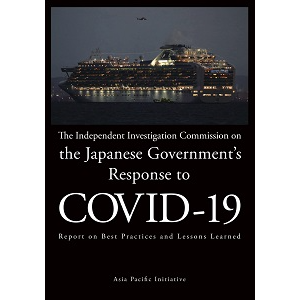On October 8, 2021, the Asia Pacific Initiative (API), an independent global think tank, published The Independent Investigation Commission on the Japanese Government’s Response to COVID-19 (API/ICJC): Report on Best Practices and Lessons Learned with Discover 21, Inc. on Amazon Kindle.
In April 2020, the Japanese government issued its first state of emergency over the COVID-19 pandemic. When the then Prime Minister Shinzo Abe lifted it the next month, Abe attributed Japan’s success in keeping infections and deaths lower than in other major industrialized countries to what he called the “Japan model” of dealing with the crisis. The “Japan model,” however, can properly be declared a model only if its efforts to bring infections under control work in tandem with its efforts to stabilize the economy. In consideration of this, during the first half of 2020, what were the effects of Japan’s countermeasures? Which policies did not work? What remains uncertain?
To review Japan’s preparedness and response to the COVID-19 pandemic, API launched the “Independent Investigation Commission on the Japanese Government’s Response to COVID-19.”
API originally published the Japanese-language version and submitted it to Prime Minister Yoshihide Suga on October 8, 2020. The commission conducted 102 interviews with 84 government officials and experts, including PM Abe; PM Suga, who was chief cabinet secretary prior to becoming prime minister; Katsunobu Kato, who was health minister prior to becoming chief cabinet secretary; as well as numerous other senior government officials who provided insight on the background of the events.
Available on Amazon Kindle Store
Amazon
ASIN: B09HQVKDFN
Publisher : Discover 21, Inc
Publication date : October 8, 2021
Language : English
Table of Contents
Foreword: Why have we launched the Independent Investigation Commission on the Japanese Governments Response to COVID-19?
Message from program director Yoichi Funabashi
Messages by members of the API/ICJC
Part I: What is the Japan model?
Chapter 1 Epidemiological assessment of Japan’s response to the novel coronavirus disease and Japanese peoples behavioral change compared to other countries around the world
Chapter 2 Balancing lives and livelihood: the challenge of trade-offs
Part II: The Japanese governments response to COVID-19
Chapter 1 The Diamond Princess
Chapter 2 Rescue of Japanese nationals from Wuhan and strengthening border measures
Chapter 3 Participation of experts and initial behavioral change policies (The Three Cs and nationwide school closure)
Chapter 4 State of emergency and soft lockdown
Chapter 5 Lifting the state of emergency
Chapter 6 Economic measures
Chapter 7 PCR and other tests
Chapter 8 Medicines and vaccines
Chapter 9 Border control (Resumption of international travel)
Part III: Best practices and challenges
Chapter 1 Preparedness against a pandemic crisis
Chapter 2 Prime Minister’s Office
Chapter 3 The Health, Labor and Welfare Ministry (MHLW)
Chapter 4 Medical and nursing care system
Chapter 5 The Expert Meeting on the Novel Coronavirus Disease Control
Chapter 6 Crisis communication
Chapter 7 National and local governments
Chapter 8 Policy implementation power
Chapter 9 Global health diplomacy
Part IV:
Conclusion and Recommendations
Was the Japan model successful?-A responsibility to learn how to learn
Special interview
Yasutoshi Nishimura, minister in charge of the response to COVID-19 (Economy revitalization minister)
Shigeru Omi, president of the Japan Community Health Care Organization (Deputy chair of the Expert Meeting on the Novel Coronavirus Disease Control, chairman of the Subcommittee on Novel Coronavirus Disease Control)
Yuriko Koike, governor of Tokyo
 APIニュースレター 登録
APIニュースレター 登録